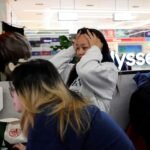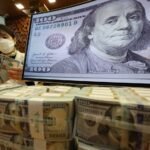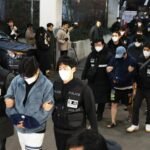
South Korea and the US are expected to ramp up efforts this month to break the deadlock in their tariff talks, which have stalled over the details of Seoul’s pledged $350 billion US investment package.
South Korean Finance Minister Koo Yoon-cheol is set to meet with US Treasury Secretary Scott Bessent in Washington DC this week, according to the Korean Ministry of Economy and Finance.
The timing, format and agenda of their bilateral meeting remain undecided, according to people familiar with the matter.
But the planned meeting is stoking cautious optimism the two countries might narrow their differences over Seoul’s demand for an unlimited currency swap line, a key striking point in their broader negotiations surrounding the $350 billion US investment pledge.
Koo, who also serves as deputy prime minister for the economy, will sit down with Bessent on the sidelines of a meeting of the G20 Finance Ministers and the annual International Monetary Fund (IMF) gathering that begin on Oct. 15 in Washington DC.

SHARED UNDERSTANDING
Their upcoming meeting follows South Korean Trade Minister Kim Jung-kwan’s October 4 visit to New York, where he met with US Secretary of Commerce Howard Lutnick to discuss the details of the two countries’ tariff agreement.
Upon arrival to Seoul on Oct. 6, Kim told reporters that the two countries reached a shared understanding that $350 billion investment in the US carries significant and sensitive implications for the foreign exchange market.
“Regarding our proposal, we’re narrowing our differences, especially on the foreign exchange market front,” he said.
However, he noted that it remains unclear whether the two sides will ultimately agree to an unlimited currency swap arrangement.

AMENDMENT TO A DRAFT OF MOU
Before Kim’s meeting with Lutnick, Seoul submitted a revised memorandum of understanding proposal to Washington for their tariff agreement, under which the US had agreed in July to lower reciprocal tariffs to 15% from 25% on South Korean products.
According to officials familiar with the matter, the revised proposal includes three key demands: an unlimited currency swap arrangement, a reasonable cap on the proportion of direct investment by South Korea in the US and a guarantee that Seoul will have a say in selecting investment targets based on commercial viability.
The amended proposal followed South Korean President Lee Jae Myung’s call for the US to approach tariff negotiations on a “commercially rational” basis during his meeting with Bessent in New York in September.
This month, Seoul and Washington are expected to continue high-level trade talks, fueling optimism that the two sides may soon finalize their long-delayed tariff agreement.
Finance Minister Koo is expected to hold follow-up talks with Bessent during the upcoming Asia-Pacific Economic Cooperation (APEC) Finance Ministers’ meeting in Korea next week, as well as at the APEC summit to be held in Gyeongju, Korea, later this month.
By Yeonhee Kim
yhkim@hankyung.com
Jennifer Nicholson-Breen edited this article.















